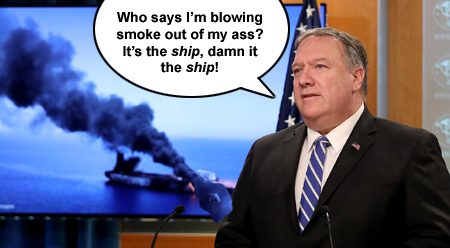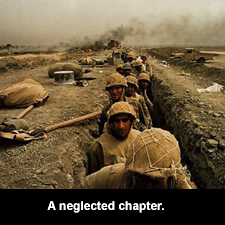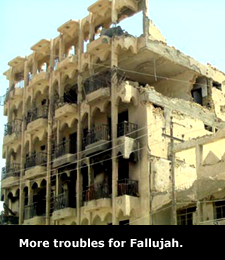Despite the occasional bleat that no one wants war and that we are not seeking conflict in the Gulf, the United States continues to move closer and closer to some kind of clash with Iran. Administration officials are blaming the Iranian government for attacks against tankers owned by nations who still do business with Iran, citing non-existent evidence of sabotage by the Iranian Revolutionary Guard – evidence contradicted by the owners of the Japanese ship that was attacked. Right wing blowhards like Senator Tom Cotton of Arkansas are advocating for strikes against Iran, and this is treated as a serious policy proposal. Various spokespeople for the administration’s ever-emerging policy even raised the possibility of the U.S. providing naval escorts for commercial ships in the Gulf, modeling it on the tanker war phase of the Iran-Iraq war in the 1980s.

This last bit fascinated me. It’s so unusual for our leaders to even mention the Iran-Iraq war, I suspect largely because we had a dog in that fight … and the dog was named Saddam Hussein. (Also, one of the ships we sent to the Gulf on that particular mission was the U.S.S. Vincennes, which on July 3, 1988 shot down Iran Air flight 655, killing all 290 passengers on board, 60 of whom were children.) If this is the mark of a successful policy to be imitated, god help us. Few Americans will recall that Saddam Hussein started that war, in 1980, using chemical weapons liberally against the Iranians – weapons whose primary components were purchased from (West) Germany, I believe. One of the principal outcomes of the Iran-Iraq war was the invasion of Kuwait, subsequent Gulf War, then the 12-year strangulation and ultimate invasion of Iraq by the U.S.
This is to say that war can sometimes sound a lot simpler than it actually turns out to be. People like Mike Pompeo and John Bolton, of course, are driven by ideology and really don’t care if their war with Iran turns out to be a disaster. But aside from the very crucial questions of whether the policy is right or legal, I think it’s fair to say that this administration’s deliberate push from functional diplomacy to the brink of armed conflict is reckless and potentially catastrophic, given the current state of international affairs. We are desperately in need of action on the ensuing climate crisis, and these nutjobs are driving us into another pointless war, damn the consequences.
I strongly suggest you contact your congressional representatives and urge them to oppose this policy. The switchboard is 202-224-3121. You may also want to use the Stance app, which is very easy to use when phoning your house member and senators. Right now, it’s our best chance at heading off this madness.
luv u,
jp

 One such story is the Iran-Iraq war (1980-88). which I have mentioned previously in the blog over the years. This, in my opinion, is one of those seminal conflicts that set the stage for much that followed in this unfortunate region. The United States and U.S. allies in Europe and the Persian Gulf (particularly Saudi Arabia and the UAE) played a central role in this horrendous war, a role which has virtually been expunged from pop culture history. One example is the
One such story is the Iran-Iraq war (1980-88). which I have mentioned previously in the blog over the years. This, in my opinion, is one of those seminal conflicts that set the stage for much that followed in this unfortunate region. The United States and U.S. allies in Europe and the Persian Gulf (particularly Saudi Arabia and the UAE) played a central role in this horrendous war, a role which has virtually been expunged from pop culture history. One example is the First, we helped the thug/torturer Saddam Hussein from the earliest moment in his career, when in 1959 he made a botched attempt at becoming Iraq’s Lee Harvey Oswald, taking a shot at the country’s leader Qasim (who had taken power the year before after a coup against King Faisal). Hussein ran to Tikrit, then was spirited away to Beirut, where he lived on the CIA’s dime, then to Cairo, where – again – he was a guest of the CIA. Qasim was a nationalist, socialist type, so we were glad to support the Ba’ath party takeover in 1963 and Hussein’s subsequent rise to power.
First, we helped the thug/torturer Saddam Hussein from the earliest moment in his career, when in 1959 he made a botched attempt at becoming Iraq’s Lee Harvey Oswald, taking a shot at the country’s leader Qasim (who had taken power the year before after a coup against King Faisal). Hussein ran to Tikrit, then was spirited away to Beirut, where he lived on the CIA’s dime, then to Cairo, where – again – he was a guest of the CIA. Qasim was a nationalist, socialist type, so we were glad to support the Ba’ath party takeover in 1963 and Hussein’s subsequent rise to power. Anyway, there was the usual stories about boys choirs singing “Death to America!”, the “Down with Israel” chants, etc. (Probably could hear that in Times Square if you listen hard enough.)
Anyway, there was the usual stories about boys choirs singing “Death to America!”, the “Down with Israel” chants, etc. (Probably could hear that in Times Square if you listen hard enough.)  mortality rates in Fallujah have reached ridiculously high levels in the wake of the U.S. assault, very likely the result of our use of depleted uranium munitions. The casing materials from these armor-piercing shells caused untold misery in Iraq in the years following the Gulf War, during which time essential medical supplies were being withheld from them by virtue of U.S. /U.K. sanctions. (Cockburn’s colleague Robert Fisk tells the story in his book
mortality rates in Fallujah have reached ridiculously high levels in the wake of the U.S. assault, very likely the result of our use of depleted uranium munitions. The casing materials from these armor-piercing shells caused untold misery in Iraq in the years following the Gulf War, during which time essential medical supplies were being withheld from them by virtue of U.S. /U.K. sanctions. (Cockburn’s colleague Robert Fisk tells the story in his book